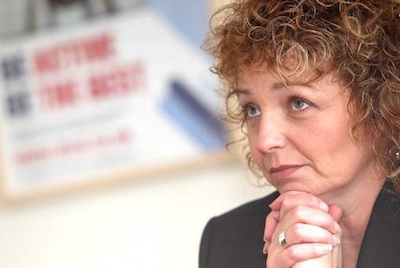
The Council of Europe has accused the Stormont administration of blocking the growth and promotion of the Irish language in the north of Ireland.
It said hostile attitudes by government officials were preventing its use in the courts and in education, and warned that Stormont was also in breach of a charter of rights because of delays and attempts to block requests for bilingual street names.
One unionist councillor in county Fermanagh recently described the Irish language as ‘foreign and gnomish’ and, in a leaked e-mail, vowed to fight the “introduction” of Irish to Enniskillen -- a town whose name was anglicised in the 17th century from the Irish ‘Inis Ceithleann’.
The European review of minority languages also said the British government has not been able to justify banning the use of Irish in the courts, or allowing people to take citizenship tests through the language.
The Council of Europe criticised attitudes to Irish in some official circles and what it said is the Stormont Assembly’s “persisting hostile climate”.
Caral Ni Chuilin, Minister for Culture, Arts and Leisure who is responsible for overall promotion of the language, said she hoped this would change.
But she pointed out any change to policy on languages in the north of Ireland requires the agreement of the Executive and Assembly, ands is therefore subject to a unionist veto.
“I hope that all supporters of the Irish language will work together to convince the Executive, the Assembly and all our people of the merits of supporting an Irish Language Act,” she said.
The review team hit out at the lack of the long-awaited Irish Language Act, originally agreed as part of the 1998 Good Friday Agreement; Irish-medium pre-schools; primary education in Irish; and free school transport for Irish language schools, despite a recent judicial review case against the Department of Education on the issue.
COMMISSIONER RESIGNS
Meanwhile, in the 26 Counties, a nationwide campaign to address the Dublin government’s failure to provide ongoing support for the Irish language is due to be launched in the coming weeks.
Over 200 people attended a public meeting in Dublin recently organised by Conradh na Gaeilge in response to the resignation last month of an Commisineir Teanga Sean O Cuirreain.
The meeting heard that Mr O Cuirreain quit his position in protest at the failure by the Dublin government to implement legislation designed to improve services to the public through Irish.
“Sean O Cuirreain’s resignation has really galvanised people - there is a real sense of crisis that needs to be addressed,” said Conradh na Gaeilge general secretary, Julian de Spainn.
ANTI-GAELIC RACISM
And in a bizarre development, a Glasgow private hire driver refused to allow visitors to speak Irish Gaelic in his car -- even though Gaelic is also a native language in Scotland.
The man, who has not been named, reportedly threw the Donegal visitors out at the side of the road at 2am after they objected to his demand that they stop speaking in Irish.
Kathleen McAleer, a local mental health nurse, said her cousins were talking to each other in Gaelic, which is their first language. “The taxi driver turned around and said to them ‘Stop speaking in that language’. We didn’t really know how to take it. He said: ‘When you are in Britain, it is English you speak.’
“I said to the driver ‘Excuse me’, shocked that somebody would say that to them. I said: ‘That is out of order’. He then said: ‘If they want to speak in that language they can get out of my taxi.’ So we got out and said we wouldn’t pay.”
The driver is currently under investigation under hate legislation.
![[Irish Republican News]](https://republican-news.org/graphics/title_gifs/rn.gif)
![[Irish Republican News]](https://republican-news.org/graphics/title_gifs/harp.gif)

